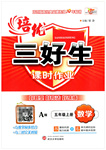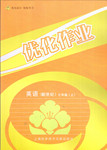题目内容
【题目】请修改以下作文,短文共10处错误,每句最多有两处错误。错误涉及一个单词的增加、删除或修改。
增加:在缺词处加一个漏字符号(∧),并在其下面写出改加的词。
删除:把多余的词用斜线(\)划掉。
修改:在错的词下画一横线,并在该词下面写出修改后的词。
注意:1.每处错误及其修改均限一词。
2.只允许修改10处,多者(从第11处起)不计分。
Nowadays more and more people would rather to look for a job on the Internet than in the job market. There are many reasons for my preference, one of which is that a job hunter can find job conveniently. He needn’t bother to get recommendations from friend. Besides, a job hunter can get one by simple sending resumes by e-mail but the success rate is very high. Even if one failed to make it, he won’t feel embarrassing.
I believe job-hunting on the internet will win favor in more and more jobless people for its convenient, efficiency and success rate.
【答案】
【1】去掉to look for中的to
【2】my→their
【3】find ∧ job加a/his
【4】friend→friends
【5】simple→simply
【6】but→and
【7】failed→fails
【8】embarrassing→embarrassed
【9】in→with/among
【10】convenient→convenience
【解析】
试题分析:本文讲述目前人们更喜欢在网上找工作,分析了这种现象的原因。
【1】去掉to look for中的to would rather+动词原形,表示“宁愿做某事”,故去掉to look for中的to。
【2】my→their 根据前面的more and more people可知,要把my改为their。
【3】find ∧ job加a/his 句意:一个找工作的人能方便地找到一份(他的)工作。job是可数名词,前面必须要有冠词或者其他词修饰,故在find ∧ job加a/his。
【4】friend→friends 表示“来自朋友们的建议”。名词用复数形式,故把friend改为friends。
【5】simple→simply 副词修饰动词,故把simple改为simply。
【6】but→and 句意:通过发送简历得到工作,并且成功率很高。此处表示递进关系,故把but改为and。
【7】failed→fails 句意:即使一个人没有成功,他不会感到尴尬。根据句意可知,用一般现在时态,故把failed改为fails。
【8】embarrassing→embarrassed 句意:他不会感到尴尬。embarrassing形容事物,embarrassed形容人感到尴尬的,故把embarrassing改为embarrassed。
【9】in→with/among 句意:我认为网上找工作会越来越受到没工作人的称赞。在“在……人中”要用介词with/among。
【10】convenient→convenience 与后面的efficiency and success rate是并列关系,故要用名词形式,故把convenient改为convenience。
【知识归纳】
1.以e结尾的形容词变成副词时,有的直接加ly ;有的把e去掉再加ly。possible---possibly;simple---simply;gentle---gently;terrible---terribly;true---truly;flexible---flexibly;immediate--- immediately;brave---bravely;wise---wisely;active---actively
2.表示情感的现在分词和过去分词
surprising令人惊讶的,surprised感到惊讶;frightening令人害怕的, frightened感到害怕; moving令人感动的, moved 感动;exciting 令人兴奋的,excited 感到兴奋;boring令人厌烦的, bored感到厌烦。现在分词的主语通常指事物;过去分词的主语通常指人。

 培优三好生系列答案
培优三好生系列答案 优化作业上海科技文献出版社系列答案
优化作业上海科技文献出版社系列答案